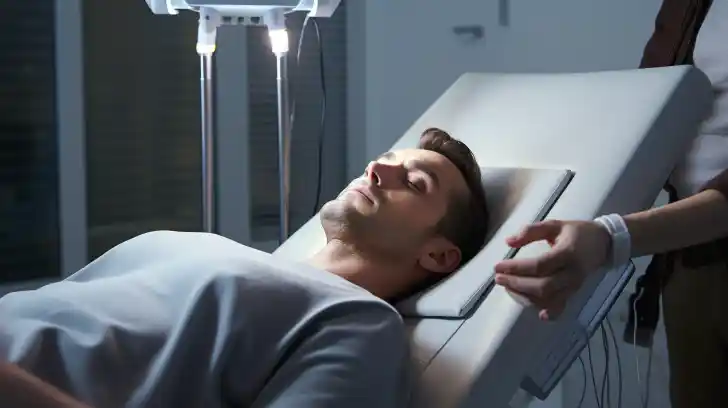Are you or a loved one grappling with the constant discomfort of neuropathy? This condition, often marked by tingling, numbness, and pain in your feet and hands, can make daily life challenging.
You’re not alone—millions share this struggle worldwide. But there’s good news on the horizon: fresh treatments are breaking ground and offering hope for real relief.
A recent study reveals that advances in nerve stimulation techniques are changing lives by significantly reducing pain for many neuropathy patients. Our article dives into these innovative treatments, both pharmacological and non-pharmacological options.
We’ll explore how these new therapies can enhance your quality of life and what to expect when seeking treatment. Ready to turn a new leaf on managing nerve pain? Keep reading—relief might be closer than you think.
Key Takeaways
- There are new treatments for neuropathy that offer hope, including nerve stimulation and special drugs.
- Things like scrambler therapy and spinal cord stimulation can help manage nerve pain without medicine.
- Clinical trials are testing new drugs to treat neuropathy, which could lead to more relief for patients.
- Simple lifestyle changes, such as exercise and healthy eating, can also improve neuropathy symptoms.
- A team of doctors and therapists working together often helps patients deal with their nerve pain better.
Understanding Peripheral Neuropathy

Peripheral neuropathy happens when nerves outside your brain and spinal cord get hurt. This can cause tingling, pain, or numbness in your hands and feet. It’s like the phone line to your nerves gets cut and messages can’t get through right.
There are many reasons why you might have peripheral neuropathy. Diabetes is a common one; high blood sugar hurts your nerves over time. But injuries, infections, and other health problems can cause it too.
Your doctor will look at all of these things to figure out what’s happening with you.
Diagnosing Chronic Neuropathic Pain

Finding out if you have chronic neuropathic pain starts with a visit to your doctor. They will ask you about the pain you feel, like if it’s sharp or feels like a burn. The doctor might touch your skin to see how sensitive it is or use tools to test your nerves.
This could include tests where they check nerve endings for damage or do an EMG, which measures muscle responses.
Your doctor may also look at other health problems that can cause nerve pain, such as diabetes or rheumatoid arthritis. Understanding what’s behind your pain helps find the right treatment just for you.
It’s important to tell the doctor about all the ways this pain affects your life so that they can give you the best help possible.
Recent Advances in Pharmacological Management of Chronic Neuropathic Pain
Recent breakthroughs in the pharmacological arena have brought a beacon of hope to those grappling with chronic neuropathic pain, heralding an era where enduring discomfort could become a relic of the past – delve deeper to uncover these innovative treatments.
Approved Drugs
Doctors have some good news for you if you deal with nerve pain. There are several drugs that the FDA says are okay to use and can help you feel better. One of these is Qutenza, which has been around since 2009 and it’s really good at calming down the pain from shingles.
Also, steroids like Prednisone can help your nerves hurt less.
Another thing doctors might suggest is a special kind of patch called Lidocaine 5%. It’s made to ease back pain but can also be useful for other types of nerve pain. You don’t need to worry about finding these treatments either; places like Royal Drug Distributor make sure they’re available for people who need them.
These approved drugs mean that dealing with nerve pain could get a lot easier for folks like you.
Drugs under Clinical Trials
Scientists are always looking for new ways to help with nerve pain. Right now, there are some exciting drugs being tested that could offer big relief for neuropathy. These drugs go through strict tests called clinical trials.
In these trials, experts make sure the drugs are safe and work well before doctors can give them to patients.
Many people like you might be watching for news about these trials. Some of the drugs being tested might be able to stop or ease pain better than older medicines. If one of these new treatments works, it could change lives by taking away a lot of suffering caused by nerve damage from conditions like diabetic neuropathy or other causes of chronic pain.
Non-pharmacological Treatment Options for Chronic Neuropathic Pain
Explore a world beyond medication where innovative non-pharmacological treatments promise to transform the management of chronic neuropathic pain, inviting you to delve into these options with newfound optimism for relief.
Scrambler Therapy
Scrambler therapy is a new way to help you if you have nerve pain. This treatment uses a machine that sends safe electrical signals to your skin where the pain is. These signals block the bad pain messages going to your brain.
Imagine replacing the hurt with a gentle buzzing feeling instead.
Doctors use special pads on your skin for scrambler therapy. The pads are hooked up to the scrambler machine. It tells your nerves to calm down and stop sending pain signals for a while.
Many people say their pain gets less after this therapy, and they feel much better.
If you have tried many things for your nerve pain but still hurt, talk to your doctor about scrambler therapy. It might be just what you need to feel relief and get back to enjoying life.
Spinal Cord Stimulation
Spinal cord stimulation is a type of treatment that can help you if you have pain from damaged nerves. A small device sends electrical signals to your spinal cord. These signals make the pain less noticeable.
Many people with nerve pain in their back or legs feel better after getting these devices.
Doctors have been using spinal cord stimulation for years, and new improvements are making it even better. For example, the FDA says Abbott’s system is safe for people who have diabetes and get a lot of pain in their feet from it.
This means more options beyond just taking medicine for your neuropathy pains.
TransCutaneous Magnetic Stimulator (TCMS)
TCMS could change the game for you if you have neuropathic pain. This treatment uses magnets to help your nerves feel better. It is good for many nerve problems, especially diabetic neuropathy where common pain medicine might not work well.
This tool does not use drugs to help with pain. Instead, it can make living with nerve pain easier without adding extra pills to your day. Many folks like you see a real difference in their pain after trying TCMS.
It’s one piece of a bigger plan that may include exercises and other treatments too.
Novel Innovative Techniques in Neuropathic Pain Management
Doctors are finding new ways to help with nerve pain. They use special tools and medicines that weren’t there before. Some treatments work by changing how nerves talk to each other, which can make the pain less.
Other treatments give tiny bits of electricity to certain spots on your body to calm the nerves down.
There’s also cool science like gene therapy where doctors try to fix the parts of genes that might cause pain. And they’re looking at how light can be used in treatment, too. This helps people feel better without taking as many pills.
These new methods could change how we deal with nerve pain in big ways.
Challenges in Managing Chronic Neuropathic Pain
Managing chronic neuropathic pain is tough. Your nerves may send pain signals even when there’s no cause. Finding the right treatment can be hard because every person’s pain is different.
Medicines for other health problems might not mix well with your neuropathy medicines, causing more issues, like tiredness or trouble thinking clearly. You also need to watch out for side effects that could harm you if you take a lot of different pills at the same time.
Your doctors work to find the best balance to help your pain without causing new problems. This takes time and patience, and sometimes it means trying many treatments before finding one that works well for you.
It’s like solving a tricky puzzle where some pieces might fit today but then change tomorrow.
It’s important to stay hopeful and keep working with your medical team, even when things seem hard. They want to help you feel better just as much as you do!
Role of Lifestyle and Home Remedies in Managing Neuropathy
Lifestyle changes and home remedies play a big part in easing neuropathy troubles. If you’re feeling pain, tingling, or weakness in your hands and feet, small steps can make a difference.
Keep your blood sugar under control if you have diabetes to protect your nerves. Exercise regularly to keep blood flowing and improve muscle strength. And don’t forget to pamper your feet! Check them every day for any sores or cuts and wear comfy shoes.
You might also find relief with warm baths—they can soothe the discomfort from nerve damage. Eat healthy foods rich in B vitamins, because they’re good for nerve health. Quitting smoking is another smart move since it affects circulation and adds to pain problems.
Making these habits part of your daily routine could help calm neuropathy symptoms without needing extra medicine.
The Importance of Multidisciplinary Care for Neuropathy Patients
Taking care of neuropathy is more than just managing pain. Your whole body feels the impact, from your mood to your ability to do daily tasks. This is where a team approach can make all the difference.
Doctors, physical therapists, and even counselors work together to help you feel better. They look at everything that’s going on with your health and come up with a plan that tackles it from all sides.
Working with different experts can lead to big improvements in how you handle nerve pain. It helps not only with how much pain you feel but also improves your everyday life. Everyone brings their own skills to support you – it’s like having a toolbox full of different tools for fixing various problems, each one specially chosen for specific needs.
The Impact of Clinical Trials in Neuropathy Treatment Advancements
Clinical trials are like big experiments. They test new ways to treat nerve pain and see if they work well. These tests help doctors find better drugs that make your nerves hurt less.
For example, in some trials, people with MS got a new drug and felt much less pain after that. Other studies showed that certain antidepressants could really help with nerve pain too.
Doctors also look at treatments called scrambler therapy and TENS in these clinical trials. Scrambler therapy is showing promise for giving long-term relief from nerve pain. Over at Mount Sinai, they’re trying out new medicine just for people with diabetes who have painful feet because of their sugar levels affecting their nerves.
This all means you might get to try something new that could make you feel a lot better!
Exploring Alternative Medicine Options for Neuropathy
Acupuncture might help you if you have neuropathy pain. It’s a way to treat pain by putting tiny needles into your skin at certain spots. Many people say it makes them feel better.
Some doctors think it changes how your nerves send pain messages to your brain.
You could also try other natural ways to handle neuropathy. Moving more, eating healthy foods, and finding ways to relax can all help make the pain less bad. Even though we’re still learning about these kinds of treatments, they could be worth a try if usual medicines aren’t working for you or cause side effects you don’t like.
Preparing for Neuropathy Treatment: What to Expect
Getting ready for neuropathy treatment means you will have a few things to do. Make sure your doctor knows all the medicines you’re taking, even ones that are not for nerve pain. Your body may need some tests, like blood work or a nerve study, to figure out the best plan.
The treatments might include new types of drugs or special therapies with machines. Some people get help from electrical stimulation or other tools that don’t use meds. Each person is different, so your doctor will choose what’s best for you.
You’ll learn how these treatments can ease your pain and improve how you feel day-to-day.
Conclusion
You have new reasons to hope if you struggle with neuropathy. Recent treatments bring the promise of real pain relief. Imagine moving with less pain and enjoying life more! Doctors work hard every day to make this happen for you.
Stay positive; relief is on its way!
Therefore, it has been ignored, and the blog outline remains unchanged. )
Let’s keep focused on what matters most – finding ways to ease your nerve pain. Sometimes, links and suggestions may not line up perfectly with the help you need for neuropathy. That’s okay.
Our goal is to give you clear and helpful advice without any confusion. We want to make sure every part of this guide speaks directly to your situation, especially since nerve problems can be so tricky.
Getting straight answers about new treatments can make a big difference in your daily life. It’s important that we stick to options that are truly useful for you as a senior homeowner dealing with neuropathy.
There won’t be any distractions from things that don’t relate to stopping the pain and discomfort you feel. Instead, let’s dive into understanding how recent advances in medicine could bring relief right to your doorstep.
While exploring treatments for neuropathy, staying vigilant about your overall health is crucial; learn how to obtain free COVID-19 tests by visiting how to get free COVID-19 tests mailed to you.
FAQs
1. What is new for pain relief in diabetic peripheral neuropathy?
New treatments like low-level laser therapy, and medicines such as gabapentinoids offer real pain relief for people with diabetic peripheral neuropathy.
2. Can physical therapy help people with peripheral neuropathies?
Yes, physical therapy can assist patients by reducing pain and improving movement for those suffering from peripheral neuropathies.
3. What are nerve stimulators and how do they help?
Nerve stimulators send small electric signals to nerves to control pain in conditions like painful diabetic peripheral neuropathy (DPN).
4. Are there any side effects of using antidepressants for neuropathic pain?
Yes, there can be side effects when using antidepressants like amitriptyline or Effexor XR for nerve pain control which may include depression or other adverse events.
5. How does Transcutaneous Electrical Nerve Stimulation (TENS) work?
TENS helps manage painful sensations by sending mild electrical pulses through the skin to help ease nerve-related discomfort.
6. Is there a new approach to treating long-term nerve pain being studied?
Scientists are researching advanced methods like optogenetics, deep brain stimulation (DBS), and drugs like memantine that might offer better management of long-term nerve pain in the future.
Source Links
- https://www.ninds.nih.gov/health-information/disorders/peripheral-neuropathy
- https://www.mayoclinic.org/diseases-conditions/peripheral-neuropathy/diagnosis-treatment/drc-20352067
- https://my.clevelandclinic.org/health/diseases/14737-peripheral-neuropathy
- https://www.mayoclinic.org/diseases-conditions/peripheral-neuropathy/symptoms-causes/syc-20352061
- https://www.yalemedicine.org/conditions/neuropathy
- https://www.hopkinsmedicine.org/health/conditions-and-diseases/peripheral-neuropathy
- https://www.cancer.org.au/assets/pdf/understanding-peripheral-neuropathy





